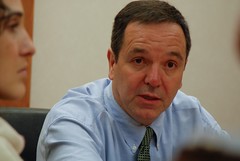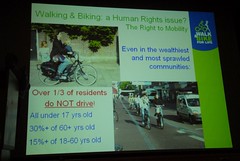
Carfree Cities Conference.
(Photos © J. Maus)
During his inspiring keynote speech at the Carfree Conference yesterday, Gil Penalosa gave Portlanders a lot to think about.
Penalosa is the former Commissioner of Parks, Sport, and Recreation for the city of Bogota, Colombia. During his tenure, he transformed that city (population 7 million) by creating hundreds of acres of new parks, developing a connected network of greenways (linear parks) and bike paths, setting up an ambitious public transit system (utilizing Bus Rapid Transit) and establishing the “Ciclovia”, a carfree streets program adored by millions of Bogota residents each week (and by urban planners around the world).
Now Penalosa — whose brother (and former mayor of Bogota) Enrique I wrote about in 2006 — has reinvented himself as executive director of Walk and Bike for Life, a non-profit dedicated to inspiring cities around the world to improve their quality of life by becoming more people-friendly.
During his presentation Tuesday, Penalosa was clearly excited that the term “carfree” is now making regular headlines across America. Just yesterday, New York City announced an ambitious “Summer Streets” program that will close nearly seven miles of streets in downtown Manhattan to cars during three days in August.
Penalosa gave part of the credit for New York City’s carfree event to Portland:
“Portland has a lot to do with it. Because in New York they were thinking about it… they said, Portland is doing it, and Chicago’s doing it, so New York said, we’re going to do it ahead of them… but this is such a healthy competition.”
“The reality is that Portland is far from being great, you have to realize that.”
— Gil Penalosa
But even with more and more cities taking a hard look at their transportation planning these days, Penalosa said, “There is no doubt that we are not doing enough.” He laid out the challenge that lies ahead by saying that the U.S. will add 100 million more people in the next 35 years (equal to the combined population of our 24 largest cities).
He challenged the audience:
“We must not only improve existing cities, we must build great cities… This is a wonderful and historic challenge, but it’s a fantastic opportunity because never before and never after are we going to build so many communities for so many people, in such a short period of time.
Unfortunately most of them are not being built like they should, so we’ve got to get moving.”
He then asked, “What kind of cities are we going to build? How do we want to live?” and said, “a city is only a means to a way of life.”
Throughout his presentation, Penalosa stressed that creating livable cities is about “economic survival”:
“In an ever more globalized world, the best people can live anywhere in the world. So why would they live in Portland, and not in Seattle or New York or Copenhagen or Sao Paolo, or wherever?
The other day I met a university professor from Texas and he got an offer for another job at another university in a different state with 10% more salary and he didn’t even think about it. Then he got another offer for 12% more salary and again he didn’t think about it. Then he got an offer to work in Portland with the same salary, not one cent increase, and he was thinking about it.
That’s the magic of having great cities.”
Penalosa said how to attract and retain highly creative and educated people is “the challenge of any city,” and that, “A good city is not just about engineering, it’s much more akin to an art.”
And although he praised Portland, he also warned against becoming too complacent.
“Sometimes it’s really hard to go from good to great. Sometimes it’s easier to go from bad to great because when you are bad you are willing to take more risks and you are willing to try different things. When you are good you become complacent.”
Then, he just came out and said it: “The reality is that Portland is far from being great, you have to realize that.”
Referring to Portland’s recent Platinum award, Penalosa said he wished the League of American Bicyclists had an award that “no one would ever get… like one of those rabbits in a dog race.”
Building a great city, he said, “has to be a process of continuous improvement.”
Where can Portland improve? Penalosa said we need to look at who’s riding today.
He pointed out PDOT stats showing that two out of three cyclists are men and that, “in places where 20-30% of the people are riding, usually more than half are women.”
Penalosa also pointed out that in Portland, 70% of cyclists are 25-50 years old and that no area in the city has over 10% bike usage.
Then he asked,
“Does Portland want to play with the heavyweights or the lightweights? Does Portland want to stay as champion of the little league of soccer across North America? Or, does Portland want to be champion of the World Cup?”
How can Portland (and other cities) begin to compete with in the World Cup of Great Cities? Here’s a slide from Penalosa’s presentation that lists how to, “Go from thinking and saying, to DOING:”

After his presentation, Penalosa (and League of American Bicyclists Director Andy Clarke, who also spoke yesterday) joined the media for a private press conference. I’ll post some video and thoughts from that later today.
I also recorded the audio from Penalosa’s presentation and, depending on quality and interest, I will post it here soon.
Visit the Carfree Conference page for more coverage or browse through the latest images in the Carfree Conference Photo Gallery.



